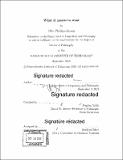| dc.contributor.advisor | Stephen Yablo. | en_US |
| dc.contributor.author | Phillips-Brown, Milo. | en_US |
| dc.contributor.other | Massachusetts Institute of Technology. Department of Linguistics and Philosophy. | en_US |
| dc.date.accessioned | 2020-03-09T18:53:11Z | |
| dc.date.available | 2020-03-09T18:53:11Z | |
| dc.date.copyright | 2019 | en_US |
| dc.date.issued | 2019 | en_US |
| dc.identifier.uri | https://hdl.handle.net/1721.1/124093 | |
| dc.description | Thesis: Ph. D. in Linguistics, Massachusetts Institute of Technology, Department of Linguistics and Philosophy, 2019 | en_US |
| dc.description | Cataloged from PDF version of thesis. | en_US |
| dc.description | Includes bibliographical references (pages 77-82). | en_US |
| dc.description.abstract | Wanting is an easy concept to use. Talk to any three year-old and you'll know they've mastered it. Wanting is important, too. We understand one another in no small part through what they want, and wanting is a pillar in theories of mind and ethics. An account of wanting, then, must do dual duties: be powerful enough to carry this theoretical burden and simple enough to explain wanting's effortless use in daily life. The first two Chapters of this dissertation discharge these duties in part. The latter two Chapters complicate the task of discharging them further. Chapter 1. Folk psychology and decision theory both represent our belieflike and desire- and preference-like states. Both use these representations to explain and predict our actions. If we can't account for one in terms of the other, we'd have a dubious dualism-two competing systems of representation, prediction, and explanation. I give a decision-theoretic account of a key folk psychological notion-wanting. | en_US |
| dc.description.abstract | Chapter 2. What we want depends on what we believe. Yet you can want to stay home (it would be nice to) despite believing it would ruin your career. This case confounds my theory from Chapter 1, as well as the orthodox semantics for 'want'. In Chapter 2, I develop a semantics based idea that you want to stay home considering its benefits, but ignoring the career consequences. Chapter 3. The meaning of anankastic conditionals-like 'if you want to go to Harlem, you have to take the A train'-is clear, yet how it arises compositionally has proven an enigma. Many had thought the enigma unraveled by Condoravdi and Lauer (2016). I argue not: anankastic conditionals are still a mystery. Chapter 4 (co-authored with Lyndal Grant). | en_US |
| dc.description.abstract | The widely held Satisfactionis- Truth Principle-if A wants p, then A has a desire that is satisfied in exactly the worlds where p is true-posits an appealingly straightforward link between what we want and the satisfaction conditions of our desires, and in turn, enables appealingly straightforward accounts linking what we want, the wanting relation, and the contents of desires. We argue that the principle is nonetheless false. | en_US |
| dc.description.statementofresponsibility | by Milo Phillips-Brown. | en_US |
| dc.format.extent | 82 pages | en_US |
| dc.language.iso | eng | en_US |
| dc.publisher | Massachusetts Institute of Technology | en_US |
| dc.rights | MIT theses are protected by copyright. They may be viewed, downloaded, or printed from this source but further reproduction or distribution in any format is prohibited without written permission. | en_US |
| dc.rights.uri | http://dspace.mit.edu/handle/1721.1/7582 | en_US |
| dc.subject | Linguistics and Philosophy. | en_US |
| dc.title | What it means to want | en_US |
| dc.type | Thesis | en_US |
| dc.description.degree | Ph. D. in Linguistics | en_US |
| dc.contributor.department | Massachusetts Institute of Technology. Department of Linguistics and Philosophy | en_US |
| dc.identifier.oclc | 1142632800 | en_US |
| dc.description.collection | Ph.D.inLinguistics Massachusetts Institute of Technology, Department of Linguistics and Philosophy | en_US |
| dspace.imported | 2020-03-09T18:53:10Z | en_US |
| mit.thesis.degree | Doctoral | en_US |
| mit.thesis.department | Ling | en_US |
